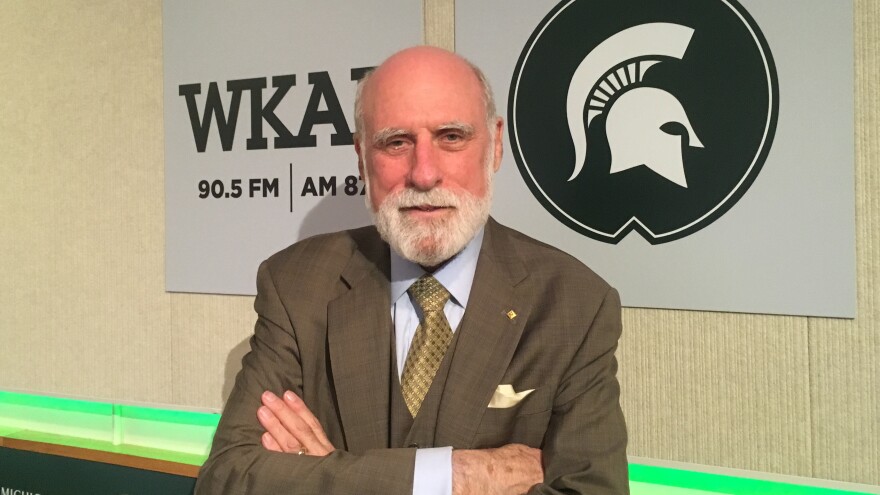Last week, a man widely known as one of the “fathers of the internet” visited Michigan State University for a Quello Center lecture called “Internet Past, Present and Future.” Vinton Cerf is a co-designer of the TCP/IP protocols and the architecture of the internet. He's been with Google since 2005. Cerf visited the WKAR studios to discuss several of topics.
ON THE EARLY DAYS OF THE INTERNET: "We were doing this for the Defense Department, so we were looking at command and control applications, which did involve voice, video and data, as far back as the early 70's. The fact that the internet has grown up to support those media is what we'd hoped for. What we didn't predict, what I didn't predict anyway, is what happens when you let the general public onto a global scale system and give them the freedom to largely say whatever they want to say or show whatever they want to show. Not everyone has your best interests at heart."
ON GOOGLE CO-FOUNDER LARRY PAGE, WHO GREW UP IN EAST LANSING: "He's already made a name for himself in several dimensions, not the least of which, he's become quite wealthy. The page ranking algorithm was largely Larry's. He was also the guy with the business model in his head. He didn't have the advertising business model, but that came fairly early in the story of Google. Larry and (co-founder) Sergey (Brin) both get enormous credit for encouraging people to shoot for 10X even if it doesn't work rather than .1X that is guaranteed. Allowing people to try things that might not work is a hallmark of Larry's management style, and it shows in what's happened at Google."
ON FEDERAL NET NEUTRALITY LEGISLATION: "I was a vocal spokesperson for net neutrality. Google has been a little quieter on the topic. I still believe that it's a very important concept that should be instantiated in an enforceable way. However, there are some people that misunderstand what is meant by net neutrality. What I mean by this is not that every packet is treated identically. I think low latency is important, I think high capacity is important; it does not mean you can't charge for more usage. What it means is that every user, whether that's a company or a person, should have equal access under the same terms and conditions to the various services of the network. That might mean low latency for video and games; it might mean high capacity for file transfers. It's the fairness under the same terms and conditions that counts."
ON WHAT'S AHEAD FOR THE INTERNET: "There are several things that are absolutely predictable right now. First of all, it's more wireless access at higher speeds, for sure. Second, the internet of things is a tsunami that's on its way, with both benefits and some serious potential deficits: security, safety, privacy, reliability. I can confidently say that the interplanetary extension of the internet, which is already in operation, will certainly expand over the decades ahead, providing a backbone to support manned and robotic exploration of our solar system."




